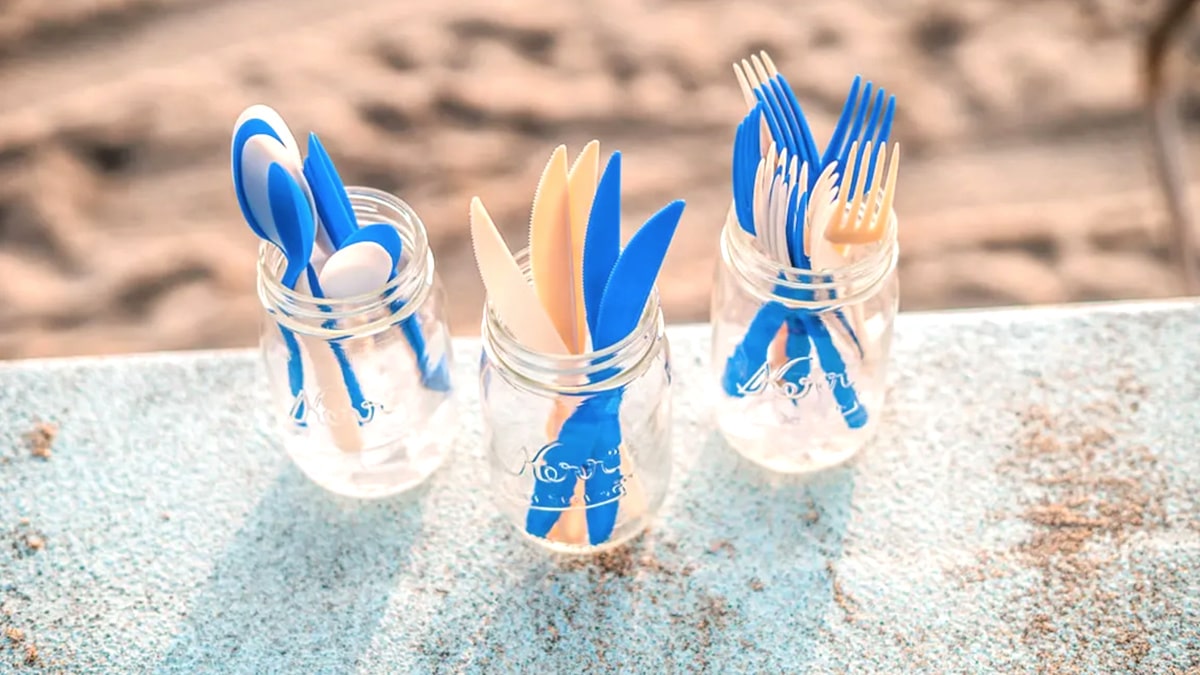
Biodegradable, Carbon-Negative Straws and Cutlery Could Help Stop Plastic Pollution

Newlight's Air Carbon cutlery is made of methane and degrades in the ocean the way cellulose would. Newlight
Newlight Technologies, a California biotech company, has set its sights on curbing greenhouse gas emissions and marine plastic pollution simultaneously. The startup uses ocean bacteria to create a new material that is made of methane, a potent greenhouse gas, and that can replace many single-use plastics and leathers.
Newlight has been exploring ways to make use of greenhouse gas emissions for more than a decade. “AirCarbon,” its latest creation, is made with ocean microbes, air and waste greenhouse gases. The new biomaterial, which can be shaped into anything from straws to office chairs to frames for glasses, is durable, completely biodegradable in the ocean and carbon-negative, the company’s website explained.
“We asked the question, how can we take carbon that would otherwise go into the air, and turn it into useful materials,” Mark Herrema, CEO of Newlight, told Fast Company. “As we looked around nature, we discovered pretty quickly that nature uses greenhouse gas to make materials every day.”
Herrema’s team found inspiration in nature-based processes that take in methane and carbon dioxide. Researchers honed in on a certain strain of ocean microbes that consume methane as food and produce AirCarbon as a byproduct.
“After they eat that gas, [the microbes] then convert that into a really special material inside themselves,” he told Fast Company. “It’s a meltable energy storage material, which you can purify and then form into various parts and shapes and pieces.”
Newlight replicated the process in land-based production tanks by combining saltwater containing the ocean microorganisms with air and methane from an abandoned coal mine, to create AirCarbon within the bacteria, Esquire reported. Researchers extracted the resultant substance and processed the material into a fine white powder which could be melted and molded into different shapes.
The methane used would otherwise have been emitted into the atmosphere, so the products are helping to sequester the greenhouse gas, Optimist Daily noted. That makes them “carbon-negative,” Esquire pointed out, and “every product they create is pollution that didn’t end up in the air and water.” The products are actually “regenerative” because the production process for AirCarbon captures or destroys more greenhouse gases than it emits, the magazine added. A Newlight press release stated that “for every one kilogram of AirCarbon produced in Newlight’s production process using methane seeping from abandoned coal mines, 88 kilograms of CO2e are sequestered.”
Because AirCarbon is produced naturally by the microbes, it also decomposes completely and naturally, the way a leaf would on the forest floor, reported Good News Network. Luckily, it won’t decompose unless faced with the same type of ocean microorganisms that created it, which means that AirCarbon products are durable, washable and reusable, Esquire noted.
Now, after a decade of refining their research, Newlight’s first AirCarbon products are coming to market, Fast Company reported. The company is launching with single-use straws and cutlery, which look and feel like plastic but degrade like paper in ocean water.
In a separate offering, Newlight has also created carbon-negative “leather” made from AirCarbon, which it is turning into wallets and handbags. Unlike natural leather, the material won’t peel or crack and doesn’t require lots of greenhouse gases in its production; unlike synthetic leather, it can be easily recycled, reported Fast Company. Finally, Newlight will also offer carbon-negative eyewear.
All products will be stamped with a “Carbon Date” that consumers can plug into a website to view how the greenhouse gases in that item moved through the production process, Esquire described. The innovative blockchain technology tracking will also allow consumers to know exactly how much carbon impact their purchase had and which independent third party calculated and certified it, Newlight’s website said.
According to the company press release, AirCarbon was named “Biomaterial of the Year” by the Nova Institute and “Innovation of the Year” by Popular Science. The World Economic Forum called Newlight a “Technology Pioneer” and the U.S. Environmental Protection Agency awarded Newlight the Presidential Green Chemistry Challenge Award.
According to Esquire, “As you hold each [AirCarbon] product, what you’re holding is a chunk of pollution that could have gone into the atmosphere but is instead a fashionable and/or functional product.”
- 4 Eco-Friendly Drinking Straw Alternatives So You Can Skip Plastic ...
- 5 Sustainable Alternatives to Plastics - EcoWatch
- Straws Made of Seaweed Could Replace Their Plastic Nemesis ...

 233k
233k  41k
41k  Subscribe
Subscribe 